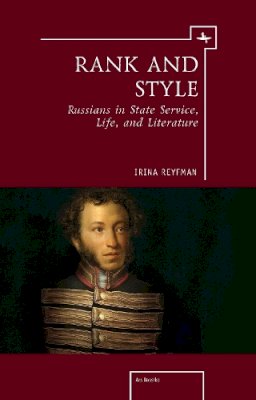Irina Reyfman (Ph.D. 1986, Stanford University) is a professor of Russian Literature at Columbia University. In her studies, Reyfman focuses on the interaction of literature and culture: how literature reflects cultural phenomena and how it contributes to the formation of cultural biases and forms of behavior. Reyfman is the author of Vasilii Trediakovsky: The Fool of the 'New' Russian Literature (Stanford, 1990) and Ritualized Violence Russian Style: The Duel in Russian Culture and Literature (Stanford, 1999; also in Russian, Moscow: NLO, 2002). She is also a co-editor (with Catherine T. Nepomnyashchy and Hilde Hoogenboom) of Mapping the Feminine: Russian Women and Cultural Difference (Bloomington, IN: Slavica, 2008).
Irina Reyfman is that rare scholar who reads contexts as subtly and as insightfully as she reads texts. In this volume the range and depth are are exceptional, stretching from the early eighteenth century to the twentieth and from duels, to love, to flogging, to the bureaucracy, and to the eternal, in short, to what draws readers to the classic Russian texts she analyzes and contextualizes with such convincing originality. Anyone who reads or teaches Russian history and literature will find this book both engaging and illuminating." —William Mills Todd III|Reyfman (Russian Literature, Columbia U.) presents 15 articles written between the early 1990s and now, most of which have been previously published. She has made revisions and translated articles originally published in Russian and has grouped them in four thematic sections, each of which she introduces. The first section, which includes her most recent investigations, concerns the Table of Ranks and how it shaped Russian writers' work. Following are articles on Pushkin, Tolstoy, and, in the last section, several articles that are not tightly united by theme, on Alexey Rzhevsky, Mikhail Murav'ev and Semyon Bobrov, and Leskov's response to Dostoevsky. —Book News, Inc.|"[Reyfman's] insights are always well grounded, perceptive and productive. The present selection is an impressive testimony to her range and conviction that a sympathetic understanding of the social framework underpinning Russian noble culture enriches our appreciation of Russian literature." –W. Gareth Jones, Bangor University; review published in the Slavonic & East European Review, 91, 3, July 2013|Overall, this is an excellent volume that will have something to offer a variety of readers. . . . the quality of the scholarship remains high throughout."
John Ellison, independent scholar; review published in the Slavic and East European Journal, 57.3 (Fall 2013).|"[The essays here] are gathered under a title so all-embracing as to encompass the extraordinary range of the author’s engagement with Russian cultural history, from the philosophical concerns of eighteenth-century poetry to the rituals of dueling. . . but including too the pervasive influence of class and chin, sexual mores, codes of honour, attitudes to death and madness, and much else besides." –John McNair, University of Queensland, in Canadian Slavonic Papers, Vol. LV, Nos. 1-2, March-June 2013

